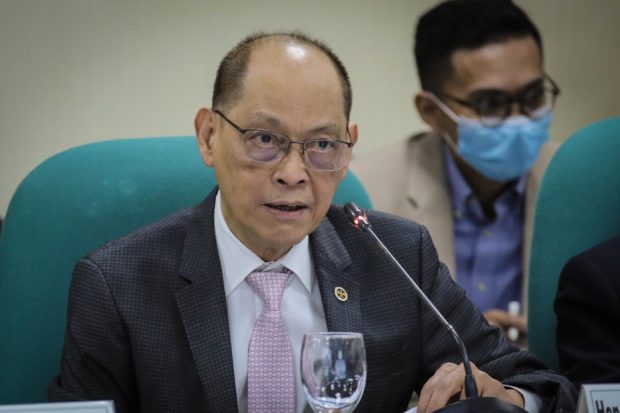MANILA, Philippines — Two Senate leaders on Monday disputed pronouncements by Finance Secretary Benjamin Diokno that other means were available that would allow the Government Service Insurance System (GSIS) and the Social Security System (SSS) to put funds in the Maharlika Investment Fund (MIF).
In a statement, Senate Majority Leader Joel Villanueva said the MIF bill crafted by Congress was clear and should leave no room for interpretation: the MIF is barred from accepting funds from the government’s pension systems.
“We believe that there is no room for interpretation regarding this prohibition — the bill as passed by the Senate and as adopted by the House of Representatives is very clear in absolutely prohibiting ‘government agencies and (government-owned and controlled corporations) … whether mandatory or voluntary’ in the Maharlika Investment Corp. (MIC) and the (MIF),” he said, quoting from Senate Bill No. 2020.
Villanueva’s reaction came after Diokno and National Treasurer Rosalia de Leon were quoted in an earlier media briefing that the GSIS and SSS were not barred from infusing funds into projects to be funded by the wealth fund.
For instance, Diokno noted that the MIC that would manage the fund could enter into joint ventures and co-investments with partners, including the pension funds.
Section 14 of the bill states that the MIC is allowed to engage in joint ventures or co-investments, and Section 15 states that the MIC board of directors “shall prescribe the form, as well as the terms and conditions, of the joint venture and/or co-investment, subject to pertinent laws, rules, and regulations.”
De Leon added that once the MIF and the MIC had been established, the MIC could approach government agencies to pick which projects could be funded as well as private-sector partners who might want to provide the funds.
“For example, the Maharlika has a big project worth P1 trillion and the GSIS or SSS wants to subscribe or invest in 10 percent of that [project] because it has a high return, they can do it … in the project, but not on equity,” Diokno said.
But Villanueva, who is acting as caretaker of the Senate, rejected Diokno’s assertion, pointing out that the intent of Congress in crafting the law was to spare pension and social welfare funds from the investments of the MIF.
Clear prohibition
The prohibition also includes funds of the Philippine Health Insurance Corp., Home Development Mutual (Pag-ibig) Fund, as well as pension funds of the Overseas Workers Welfare Administration and the Philippine Veterans Affairs Office, Villanueva said.
“This prohibition was even repeated three times — in Section 6 (2) on the allowed investors to the preferred shares of the MIC; on the last paragraph of Section 6 which further solidifies the prohibition of these agencies to invest in the capitalization of the MIC, and again in Section 12 on the investors to the MIF,” he said.
Villanueva said lawmakers would be keeping an eye on the crafting of the implementing rules and regulations (IRR) for the MIF bill once it becomes a law, clarifying that Congress has yet to transmit the measure to Malacañang for the President’s signature.
“We trust that the IRR will be faithful to the bill that we passed,” Villanueva said.
Senate Minority Leader Aquilino Pimentel III blasted the finance chief’s “play on words” as a circumvention of the prohibition imposed by the MIF law.
“They are avoiding the words used in the law like ‘initial capital, additional capital, bonds. If they say ‘subscribe to projects,’ what does that mean? GSIS and SSS will ‘finance’ the projects?” he said.
“Financing” still means “advancing the money needed,” Pimentel said.
“Isn’t that plain and simple ‘lending,’ or ‘loaning money,’ to the project? Just like buying a bond from the MIC is the same thing. (This is) circumvention in effect,” he said.
Pimentel reminded officials to keep off the GSIS and SSS pension funds, saying these are considered private funds.
“The question is: Why are they so interested in the funds or money of the GSIS and the SSS?” he asked.
